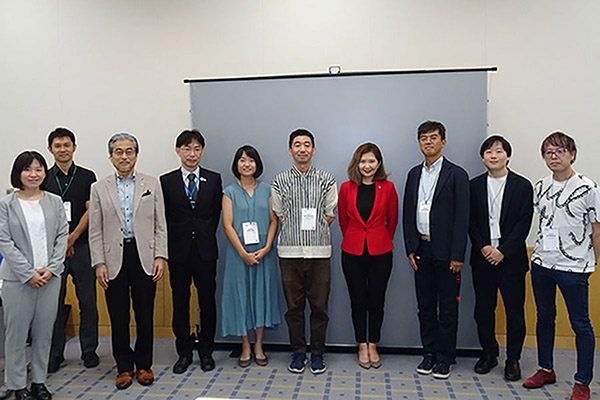2023.11.20
On September 28, the last day of the Tsukuba Conference 2023, the Symposium on Researcher Well-Being (TRiSTAR II) was held. About 30 people gathered at the venue to deepen their thoughts on the well-being environment and the state of mind with researchers from diverse backgrounds to achieve performance in the research field in Japan.
Program
(1) Lecture
1)"Well-being as a guide of research activities"
Dr. Junji Watanabe (Senior Distinguished Researcher, NTT Communication Science Laboratories)
2) Researcher’s Well-being in Academia: my experience in Germany & US
Dr. Manabu Shiraiwa (Professor, University of California, Irvine)
3) My journey towards Researchers Well-being
Dr. Amarjargal Dagvadorj (Breathe Mongolia- Clean Air Coalition "Let's take action" project, Director 's take action" project, Director)
4) Producing a place for "opening" and "meeting" - Mr. Deokje Kim (Producer, Loftwork Co., Ltd.)
(2) Panel Discussion: What is Well-being for researchers? What kind of environment can national and public universities prepare?
Dr. Ryuma Shineha (Associate Professor, Science and Technology Studies, Osaka University, Science and Technology Policy)
Ms. Shizuko Umetsu (Assistant Professor, Comparative Education, University of Tsukuba)

Dr. Watanabe, the keynote speaker, discussed the following points in his lecture. He touched upon how intrinsic values can alter the way an individual experiences happiness. He emphasized the distinction between the evaluation and practice of well-being, highlighting the importance of integrating well-being into the collective consciousness within a group. In essence, he advocated for the concept of "Collective Well-being," which seeks to harmonize both individual and collective well-being and stressed the significance of sharing values.
Dr. Shiraiwa talked about the difference in awareness of work-life balance between Japan and Germany drawing from his research experience in Germany, how to change the pace of work according to life stages, reflecting on the human environments and work environments, and how to deal with failures. He also discussed how one's pace of work can vary based on life stages, while reflecting on the human and workplace environment. Furthermore, he explored strategies for confronting and learning from failures.
Dr. Amara, a researcher originally from Mongolia with a medical license, shared her insights. Drawing from her experiences as a researcher in Japan, she discussed both the challenges she personally faced within research system in Japan, such as issues related to language and mental health support for Non-Japanese researchers, and the challenges that researchers worldwide commonly encounter, including work-life balance and economic aspects.
From Mr. Kim at Loftwork, we gained insights into initiatives that bridge the gap between researchers and society. He shared examples of open collaborations that Loftwork has undertaken in the past and underscored their significance.

In addition to the above speakers, moderator Ms. Umetsu and commentator Dr. Shineha joined the panel discussion, and the following point has been discussed.
Dr. Shineha conducted an analysis of surveys from nearly 8,000 early-career researchers under the age of 45 in Japan. According to the analysis, these early-career researchers feel that more than 40% of their time is spent on administrative tasks and management. The survey also revealed that depending on age and life stage, the research environment's concerns shifted from personal to family-related matters. The Japanese research sites must deal with these issues, which directly impact research performance.
To achieve researchers’ well-being, a mindset that embodies collective happiness is essential. This necessitates embracing the concept of "Collective Well-being," which entails considering the happiness of both individuals and the group.
As researchers, maintaining mental health involves distancing oneself from harmful individuals and cultivating resilience. To sustain resilience, it's important to belong to various communities and periodically reflect on whether one's actions might be detrimental to others.
During the in-person discussion, participants highlighted the realities and challenges that are influenced by factors such as researchers' background attributes, including being from developing countries or their gender.
We believe that conducting research and research management requires different skills and roles, we would like to see universities provide support for early-career researchers in the form of multilingual assistance, the development of project managers who can collaborate in research management, and the implementation of strategic research management.
Dr. Shineha summarized today's discussion as follows: Based on above-mentioned data and today's discussion, early-career researchers' issues include the challenges of securing employment, balancing family responsibilities, and coping with the pressure to publish papers. When considering them on a global scale, researcher well-being is a complex combination of attributes (country/region/etc.), life events, and the researcher's career. In particular, as life events change, career challenges for researchers transition to issues related to time and family, especially researchers in developing countries face those difficulties in addressing these issues. As researchers are now more conducive to earning their PhDs outside their home countries, this topic of researcher well-being will continue to be discussed from a global perspective in the future.
